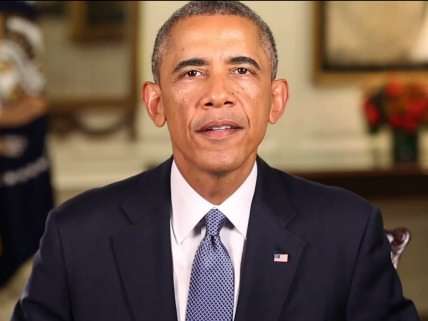Obama Grants Eight Commutations to Drug Offenders, Nearly Doubling His Total

Today President Obama issued commutations to eight federal prisoners, raising his total so far to 18. That's a far cry from the "hundreds, perhaps thousands" anticipated after the administration signaled a new openness to clemency petitions last spring, but Obama still has two more years to go, and he is no longer in danger of having the stingiest clemency record of any modern president.
Six of the eight prisoners who received commutations today were convicted of crack cocaine offenses and sentenced under a penalty scheme that is now widely recognized as excessively harsh. Congress scaled back crack sentences in 2010, but the changes were not retroactive. Thousands of crack offenders therefore continue to serve sentences that the president, the attorney general, and almost every member of Congress have said are too long.
In 1994, for example, Sidney Earl Johnson of Mobile, Alabama, was sentenced to life in prison for selling crack. Thanks to Obama's commutation order, he is instead scheduled to go free next June, having served a mere 21 years. The other five crack offenders—Cathy Lee Jones of Portsmouth, Virginia; Rickey Marcell McCall of Birmingham, Alabama; Larry Nailor of Memphis, Tennessee; Antonio Gromyko Reeves of Kennett, Missouri; and Israel Abel Torres of Dallas, Texas—will have their sentences shortened from 22 years to 12 years, from life to 14 years, from life to 18 years, from 16 years to 11 years, and from life to 17 years, respectively.
The other two prisoners who received commutations—Jennifer Regenos of Muscatine, Iowa, and Barbara Lammsies Scrivner of Portland, Oregon—were convicted of methamphetamine offenses. Obama shortened Regenos' sentence from 20 years to 13 and Scrivner's from 30 years to 20. Scrivner, who maintained that she knew nothing about the meth conspiracy in which her husband was involved, rejected a plea bargain that called for a 10-year sentence, so Obama is effectively splitting the difference.
Today Obama also issued 12 pardons, which clear people's records, typically long after they have completed their sentences. The crimes committed by the pardon recipients included illegal distilling, counterfeiting, possession of a methamphetamine precursor, selling methamphetamine, growing marijuana, wire fraud, and filing a false tax return. The longest sentence imposed, for selling meth and owning a gun while doing so, was about six years, completed in 1999. Obama's pardon total now stands at 64.
Before today, Obama's commutation total already surpassed George H.W. Bush's (three in four years), and now he also has pulled ahead of George W. Bush (11 in eight years) and Ronald Reagan (13 in eight years). But he still trails, among others, Bill Clinton (61 in eight years), Jimmy Carter (29 in four years), Gerald Ford (22 in 29 months), and that old softie, Richard Nixon (60 in 67 months).
"It's wonderful news that Obama has granted clemency to these individuals," says Anthony Papa, media relations manager at the Drug Policy Foundation, whose 15-year sentence for selling cocaine was commuted by New York Gov. George Pataki in 1996, which allowed him to go free three years sooner. "We hope this is the just the beginning of the president using his executive powers to right the wrongs of the criminal justice system."
Michael Collins, policy manager at the DPA's Office of National Affairs, adds: "The president's actions today are welcome, but they are nowhere near enough. We need a more wide-reaching clemency project, and we need Congress to move quickly on sentencing reform when it comes back in January. It's time to rectify the U.S.'s embarrassing record on mass incarceration."

Show Comments (9)